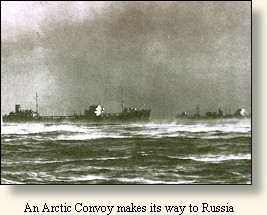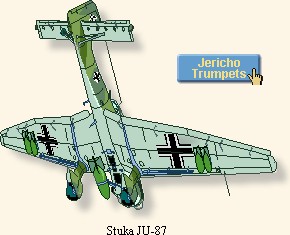Of all the convoy routes of World War II the most dangerous was the Arctic course followed by ships carrying supplies to the Russian ports of Murmansk and Archangel. Forced to follow the coastline of Nazi-occupied Norway, the convoys were not only threatened by submarines but subject to attack by land-based aircraft and surface vessels from Norwegian ports. These hazards were compounded by the brutal and often unpredictable weather. Finally, throughout the Arctic summer, these convoys were forced to tread their way north fully exposed in twenty-four hours of daylight.
"The snow and the sleet squalls passed. Wednesday gave a clear cerulean sky, a blue and gleaming sea, very little horizon or zenith cloud. This was their day, the Nazi's, we knew. We dragged our ammunition cases closer to the guns; got ready as well as we could.
They came early: the Heinkels, the Messerschmitts, the Stukas, the Junkers 89's, and all told there were 105 of them over us during that day's fight that was to last twenty hours. They used everything: 1,100-pounders, 550's, 250's, aerial torpedoes, mines, their cannons, and their machine guns; while outside, always trying to get in, their submarines rushed our escort.
That was hell. There is no other word I know for it. Everywhere you looked aloft you saw them, crossing and recrossing us, hammering down and back, the bombs brown, sleek in the air, screaming to burst furiously white in the sea. All around us, as so slowly we kept on going, the pure blue of the sea was mottled blackish with the greasy patches of their bomb discharges. Our ship was missed closely time and again. We drew our breaths in a kind of gasping-choke.
At about half-past ten that morning, the long-shanked Fourth Mate and I were on the after guns on the poop. Two Messerschmitts came after us, off the bank of broken cirrus cloud on the Northern horizon. Since Monday, the Messerschmitt squadrons had given our ship a lot of attention, no doubt remembering their pal that we had nailed. This pair came down in one-two formation, the after-most perhaps three hundred feet behind his partner. At the start of their direct dive on us they had about two thousand foot altitude.
 It was my first time to fire at them, and, eager and excited, I shot too soon. My tracers curved off; I was out of range, so I cut the guns. But they kept on coming, bigger and bigger in the ring sights, their wings growing from thin lines to thick fierceness from which lanced gun flame. We could see the bombs in the racks; we could see the bombardiers. Together, the Fourth Mate and I cut in at them.
It was my first time to fire at them, and, eager and excited, I shot too soon. My tracers curved off; I was out of range, so I cut the guns. But they kept on coming, bigger and bigger in the ring sights, their wings growing from thin lines to thick fierceness from which lanced gun flame. We could see the bombs in the racks; we could see the bombardiers. Together, the Fourth Mate and I cut in at them.
We were leaning far back, knees bent, hands hard on the rubber grips, fingers down on the triggers, eyes to the ring sights. We were no longer conscious of the empties clacketing out underfoot, of the cold, the trembling motion of the ship as the other bombs burst. Here was death, and we were throwing death back to meet it.
The aftermost plane peeled off, banking towards the ship astern. The other kept on, right into our fire, smack for us. Then he dropped it, a 550-pounder. He was gone, away from our fire, and, hanging to the guns, all we could do was look up at that bomb.
It fell, slanting with the pull of the plane's speed. It whirled, screaming and howling in the air directly over- head. We could very clearly see the cylindrical khaki shape, the fins, even the white blur that was the serial markings on the side. This was for us, we thought. This was death. Even should it miss, the concussion will take the T.N.T. There was nothing to do but hang on tighter to the gun grips. We said good-by to each other, but the bomb held our cars, the sound of it seemed to possess all sound.
Then in some sudden and not-yet-strong gust of wind it veered a bit. It struck the sea no more than twenty-five feet astern of us. There  was the impact of passage into the sea, an immense, rushing smack, then the detonation. My wife's image was before my eyes. I stood there waiting for the T.N.T.
was the impact of passage into the sea, an immense, rushing smack, then the detonation. My wife's image was before my eyes. I stood there waiting for the T.N.T.
Water went tumbling over me in a dousing, blinding column. The ship rose and fell, groaning, terribly shaking. Empty cartridges jumped under the shock, pitched off into the sea. Beneath my feet, as the ship still jarred from that awful violence, the deck seams opened, and the oakum lay loose.
Water dripped from my helmet brim into my eyes. I was soaked from the collar of my sheepskin coat to my felt-lined boots. Beside me, still at his station between me and the Fourth Mate's guns, was old Ben. He was the oldest A.B. in the ship; Ben, a Baltimore man, who in the last war had seen service at the front in France. He might have run as that bomb fell, taken out forward for the life boats on the boat deck, anywhere away from the bomb. But he stayed there; he just bent his knees and set himself and waited, empty-handed and where he belonged.
For that moment of steadfastness, I loved Ben, and I always shall. We looked staring, shaking, just about conscious, into each other's eyes, and as the frightful tightness gave from our stomachs and lungs, spoke to each other. I forget what we said, and I guess it doesn't matter. We talked as shipmates, that was all."






